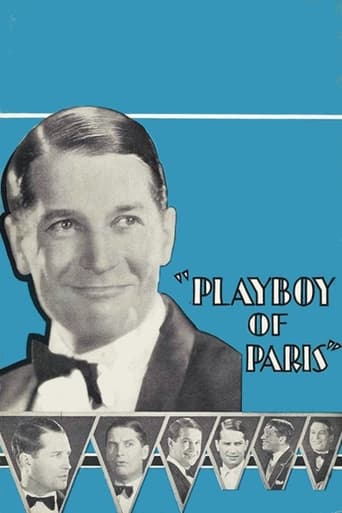richard-1787
In his few years with Paramount, from 1929-1934, Maurice Chevalier made some remarkable movies, usually with Jeannette MacDonald, directed by Ernst Lubitsch or Rouben Mamoulian. They include masterpieces like "The Love Parade," "The Smiling Lieutenant," "One Hour with You," and "Love Me Tonight," remarkable examples of clever dialog delivered with great cleverness and some great tunes. This was made at the same time, at the same studio, but it's a bomb. The script is uninteresting and certainly not funny. Chevalier, a waiter in a restaurant, comes in to a fortune but gets tricked by his boss at the restaurant such that, if he stops waiting tables, he will owe his boss 400,000 francs. So Chevalier keeps waiting tables during the day, but doing a poor job of it. That's good for only a lame joke or two.He is also seeing a wealthy society woman, from whom he wants to hide his waiter background. She's mildly attractive but very disagreeable, so it's hard to understand why he would go to the bother.There is little music, and what there is is unmemorable.My advice: skip it.
Alex da Silva
Albert (Maurice Chevalier) is a waiter who comes into a fortune. Unfortunately, he has just been persuaded by his boss Philibert (OP Heggie) to sign a binding contract which does not allow him to leave his place of employment unless he pays the owner £400,000. Well, Albert is obviously not very happy about this and he tries to get the sack on a daily basis - this apparently will break the contract - but he doesn't succeed. At the same time he is living the highlife at Paris nightclubs. As a womanizer, Albert has a few sticky situations with a couple of women but love manages to win out in the end.There are a few rare moments of actual funny comedy in this film - Chevalier throwing water onto Frances Dee who plays "Yvonne" and the scene where he tries to get the sack by making all the customers wait for ages before taking their orders, and then promptly sitting down at a spare table to play cards by himself. That's it. Nothing else is funny. In fact, the film is pretty tedious with a boring duel scene at the end. The story just peters out and ends with an extremely improbable conclusion. The women aren't particularly attractive considering that the film is meant to take place amongst the chic set of Paris. I would have thought that Chevalier could have chosen a more attractive bunch to hang out with! And the attraction that Frances Dee has for Chevalier appears out of NOWHERE - it is very phony stuff. The music is crap in this film but Chevalier is OK in his role. Unlike stupid Stuart Erwin who plays "Paul". This is a forgettable film.
bkoganbing
The Playboy Of Paris is set in, guess where with Maurice Chevalier as a happy go lucky waiter whose casual attitude and approach to life drives his boss O.P. Heggie. He also exasperates Heggie's daughter Frances Dee, but that's because she likes him a whole lot.Heggie has what he thinks to be the inside track to a claim on a fortune that he knows Maurice is going to inherit. In a move I've certainly never heard of, Heggie praises Chevalier's services so much that he gets him to sign a contract for his services as a waiter, figuring that when Maurice finds out about his several million franc inheritance, he will look to buy his way out. But Chevalier is one step ahead of him. He doesn't buy his way out, he reports to work every day and does the lousiest job of serving he's capable of. In the meantime he's also at night becoming The Playboy Of Paris, literally burning the candle at both ends. At that point he's too fatigued to do anything else but a lousy job as a waiter. And he's also got gold digging Dorothy Christy looking for ways to spend his money.Although Lewis Berger directs the cast to some good performances, the film would have been a classic with an Ernst Lubitsch at the helm. It has one of the best scores for a Chevalier film with songs by Richard Whiting, Newell Chase and Leo Robin. Two of the songs became big hits for Chevalier, It's A Great Life which is a jaunty philosophical song a salute to moderate hedonism which fits Chevalier perfectly. And Maurice also sings My Ideal one of the big song hits of 1930 and an enduring classic. Chevalier sold a few records during the cash strapped Depression years and some thirty plus years later Robert Goulet enjoyed success in reviving this enduring classic.There are some really great scenes in this film. In a bit that might have inspired Red Skelton's Guzzler's Gin sequence and Lucille Ball's Vitametavegimen girl, Chevalier goes down to the wine cellar to sample the contents in each barrel with inevitable results. Also fellow waiter Stu Erwin and cook Eugene Palette show their stuff as they prepare Chevalier to fight a duel.Why is he in a duel, well you have to watch and enjoy The Playboy Of Paris to find out.
RoryVanucchi-2
This movie was a treat from start to finish- lots of fun. The entire cast was in great form.A waiter (Maurice Chevalier) receives a vast inheritance and becomes a club-hopping playboy by night (with Stu Irwin as side-kick) and working in a café by day. Stuart Irwin and Eugene Palette also work in the restaurant (in the kitchen). O.P. Heggie is entertaining as the scheming proprietor of the café with Frances Dee as his daughter. Not much as a musical, enjoyable primarily as a chaotic 1930's style comedy.Maurice Chevalier and Stuart Erwin are terrific as usual. Fans of either of these two exceptional talents will not want to miss.


